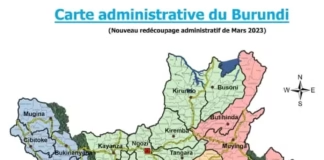“I felt discomfort, pain throughout my body, with an intense cough. I had difficulty going about my daily activities,” confides Jean Paul, 28, about the symptoms that led him to consult a doctor.
After proper examinations, it was revealed that Jean Paul was suffering from tuberculosis, a disease which has affected more than 2.4 million people in 2022 in the African Region. Tuberculosis is a public health problem in Burundi. In 2023, Burundi reported 7,940 cases of tuberculosis of all forms, according to program data published on February 26, 2024 and taken from DIHS2 (District Health Information Software 2).
“The persistence of tuberculosis as a public health problem in the country is explained by the predominance of a certain number of contributing factors including poverty, tobacco, alcohol, diabetes, HIV infection, malnutrition, etc. », notes Dr Osias Ntahombaye, Director of the Anti-tuberculosis Center in Bujumbura. “So many illnesses that make the population vulnerable to tuberculosis. »
To strengthen the fight against this disease, the Ministry of Public Health and the Fight against AIDS has opted for the decentralization of dedicated centers, i.e. one treatment unit for approximately 57,000 inhabitants. Thus, the country has 222 anti-tuberculosis centers across the national territory, including the Anti-tuberculosis Center in Bujumbura, a reference structure, which accommodates nearly a third of patients affected by this pulmonary disease in Burundi.
In each anti-tuberculosis center, treatment is provided in accordance with the international standard required by the World Health Organization (WHO). “We follow the protocol in force from the reception of the patient until their recovery. We require that they be put on TDO, the directly observed treatment,” says Dr Ntahombaye. “We have not recorded any cases of abandonment and at least 95% of patients recover their health. » The results from the Bujumbura center reflect those of other anti-tuberculosis centers.
In its drive towards the eradication of tuberculosis in accordance with the global strategy “End TB by 2030”, Burundi faces certain challenges. These include the under-reporting of tuberculosis cases, particularly with regard to tuberculosis in children and multidrug-resistant tuberculosis, the weakness in tracing contact subjects around index cases and the low systematic use of the GeneXpert device in diagnosis.
To meet these challenges, WHO has, among other things, supported the training of health workers on the different stages of care and also on the use of GeneXpert devices recommended for early detection.
WHO also supports the country with external evaluations/reviews of the tuberculosis control program which provide the country with data and information to guide strategic planning.
With the pooling of efforts, in 2023 Burundi was ranked among the countries having made enormous progress in the treatment of tuberculosis. According to the external review of the Tuberculosis Program, carried out with the support of the WHO and other partners including the Global Fund and the NGO Action Damien, the country recorded 95% therapeutic success. 99.6% of tuberculosis patients have been screened for HIV and 100% of TB/HIV co-infected patients are put on anti-retroviral treatment. During the same year, Burundi reduced tuberculosis-related deaths by 16% and tuberculosis incidence by 45%.
According to Dr. Joselyne Nsanzerugeze, Director of the National Integrated Tuberculosis Control Program (PNILT), this performance is the result of several actions. “The decentralization of treatment at the level of health facilities, the availability of medicines at all levels of the health pyramid, the availability of a fleet network making it possible to manage the questions of providers linked to the care of patients, which allows to reduce loss to follow-up, counseling sessions for patients at the start of treatment to raise their awareness, among other things, about respecting the daily intake of anti-tuberculosis drugs, the involvement of the community in the monitoring of patients undergoing treatment at home,” explains Dr. Joselyne Nsanzerugeze. She also underlined the continued capacity building of healthcare providers in the management of this pathology and the availability of quality data to guide the measures to be taken.
“Burundi has enormous assets to eradicate tuberculosis,” assures Dr. Denise Nkezimana, Manager of the TB/HIV/Hepatitis program at the WHO Office in Burundi. “The Government’s commitment, the willingness of partners to support the fight against tuberculosis, the decentralization and integration of tuberculosis services into primary health care, good coverage in terms of service offering, supply regular and uninterrupted inputs for diagnosis, the existence of a functional microscopy network, integrating an intermediate level with a sample transport system which makes it possible to involve almost all health facilities in the country in the diagnosis of tuberculosis, the availability of GenXpert, increasingly growing community involvement constitute the basis of the fight against tuberculosis in Burundi,” specifies Dr. Nkezimana.
To be more effective, Jean Paul believes that response measures should be accompanied by a good prevention policy. “If you feel the symptoms of tuberculosis, please don’t waste time. Go to a health center immediately to find out more about your health. And if it turns out that you are suffering from tuberculosis, start treatment and scrupulously follow the advice of health workers,” advises Jean Paul, who is gradually recovering. “Tuberculosis may be a serious illness, but it can be cured. In addition, the treatment is free. Fortunately, I follow my treatment well and I can no longer contaminate anyone. »
Source:WHO



